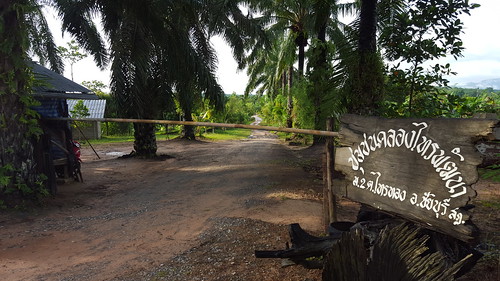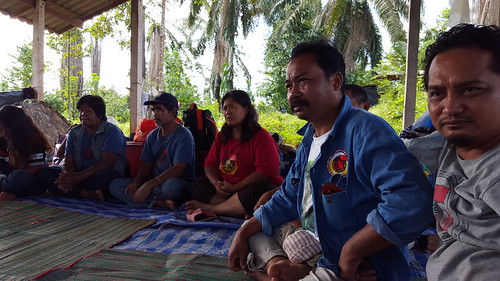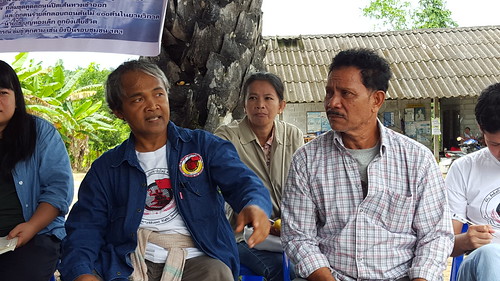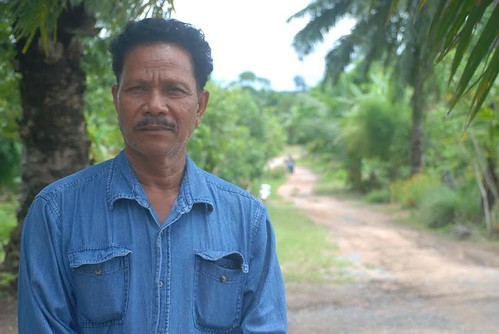This article investigates why the Khlong Sai Pattana community in Surat Thani Province has occupied a deforested protected area taken from a palm oil plantation corporation after its 30-year concession ended. Land rights activists discuss how the poor are unfairly discriminated against in their right to land to make a living, while capitalists keep reaping benefits from the land. Not only do the villagers face insecurity and judicial harassment from companies, but since the coup the authorities have foiled the villagers’ efforts to establish a system for the community to co-manage and exploit the land and forcibly evicted the villagers.
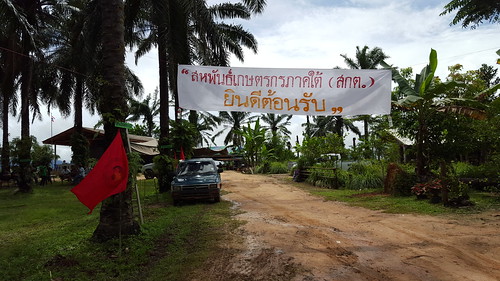
k
The gate to the village
Land disputes between the state, the corporate sector and communities are a long-standing issue in Thailand. During the period of socio-economic development, land issues have plagued Thai society. The public often hears about conflicts between the state and communities illegally occupying public land, arising from government eviction notices, on the grounds that the land is a public resource. Many indigenous communities have claimed injustice in land ownership disputes following land right verification and fact-finding processes after the state has declared their land a protected area.
State-community land ownership conflicts following the state’s declaration that land is national property are only one side of the coin. The other side is when landless farmers occupy a protected area, and is rarely discussed.
The media usually report conflicts without any context and the villagers are generally portrayed as the lazy poor who have grabbed land from the public. This misrepresentation indirectly worsens the situation and facilitates human rights violations largely due to public misunderstanding about resource mobilization.
The land dispute at Khlong Sai Pattana community, in southern Surat Thani Province is a good example. The community is part of the Southern Peasants’ Federation of Thailand (SPFT), a vocal network of southern farmers who promote land reform and community rights to land to make a living. Since the May 2014 coup d’état, army officials have attempted to forcibly evacuate the Khlong Sai Pattana community and others in the SPFT, despite a resolution with earlier civilian governments that they would be part of a community land title pilot project. The army seems to ignore this process and are adamant in issuing seven-day evacuation notices to community members.
After the deadline in September 2014, villagers were still able to reside in the area. This was not due to the mercy of the army, but due to complaints filed with the National Human Rights Commission (NHRC), who later issued a recommendation to halt eviction orders.
The land dispute in Surat Thani started around 1985 when the Gen Prem Tinsulanonda administration granted concessions to both Thai and foreign corporations on hundreds of thousands of rai of deforested land in protected areas to plant cash crops such as palm oil and rubber. Some concessionaires encroached into other protected areas, while the Thai authorities were negligent. The villagers could only look on and wait patiently for the concessions to end.
A civil society movement called the Southern Land Reform for the Poor Network was founded in May 2002 when villagers from the southern provinces of Surat Thani, Nakhon Si Thammarat and Krabi found that they faced common issues in land ownership and resource management. They petitioned the government demanding termination of the concessions and allocation of the land to communities.
Following the May 2002 demands, twenty thousand villagers gathered in a protest at the Surat Thani governor’s office. The pressure forced the Thaksin Shinawatra administration to issue a cabinet resolution in August 2003 to suspend any contract renewal process and investigate complaints of concessionaires breaching contracts. For example, if an investigation showed that the concessionaires had encroached into non-concession land, the contract would be terminated immediately. The land would then be allocated to poor and landless villagers in nearby communities.
The implementation of the cabinet resolution, however, is a different story. In the case of the protected area near Khlong Sai Pattana, the concession was given to Jew Kang Jui Pattana Company Limited.
Since 1985, the company had planted palm oil on about 1,000 rai of deforested protected land outside their concession area. In 1994, the Agricultural Land Reform Office (ALRO), under the Ministry of Agriculture and Cooperatives, declared the land an agricultural land reform area, which would be allocated to the poor. The company however refused to move out. This led to a nine-year court battle between the Ministry and the company. In the end, the Supreme Court ruled in 2014 that the company must move out. Meanwhile, the villagers occupied the contested plot in 2008.
The Beginning of Land Occupation in Surat Thani
Pianrat Bunyarit, wearing a navy jacket.
According to findings submitted to the Cabinet in 2003, there were 16 plots that the state planned to confiscate from private companies and allocate to landless farmers. Most were expired concession areas and plots which had been illegally encroached.
“In 2005, over ten thousand rai of land was allocated to over a thousand households, but more people still need help. Four million people all over the country had registered as poor who needed land. At least 20,000 people in Surat Thani alone have this problem and went to join the protest. So far, the state has allocated only eight plots. Eight other plots are still pending allocation until today,” said Pianrat.
The wait for the state to successfully evict private companies and allocate the land to the poor is endless. While people are waiting for a long-promised allocation, the corporation can reap benefits, possibly for up to ten years. The people who have less capital will wither away during several years of court proceedings. Although the state may in the end successfully evict the companies, the companies have been exploiting the land and accumulating wealth as farmers stand by waiting for their eviction and getting poorer and poorer.
Surapol Songrak, another SPFT executive committee member, told Prachatai about the great attempt by the villagers in 2003 in which the group successfully seized 13 plots in deforested protected areas in Surat Thani and Krabi, an action which was inspired by the Brazilian Landless Workers Movement (MST). The success did not last long however because they were evicted by the authorities about six months later.
The Khlong Sai Pattana community successfully occupied the plot from Jew Kang Jui Pattana Co. Ltd. in 2008 and continued to stay there since despite various kinds of threats, including the assassination of villagers.
The SPFT’s goal is to establish a sustainable measure to manage the plots among community members and prevent them from falling back into the hands of private companies. The group proposed that instead of allocating plots to individuals, the state should establish a community land title deed.
Left: Surapol Songrak
Community land title deeds will allow active and equal participation and input from community members through community meetings and a collective decision-making process, he said.
Khlong Sai Pattana Community under Threat from the State and the Companies.
Public land occupation was hard, but survival on the reclaimed land is even more difficult. In the case of the Khlong Sai Pattana community, their seven years of occupation has confronted problems from the state and private companies. Today, ownership of the land has not been granted by ALRO. Despite the Supreme Court verdict confirming that Jew Kang Jui Pattana Co. Ltd. and their subsidiaries must be evicted, their subsidiaries still occupy the land.
Khlong Sai Pattana community was set up when the villagers in Sai Thong Subdistrict of Chai Buri District moved onto the contested land in 2007, when the ALRO won the case against Jew Kang Jui Pattana Co. Ltd. and the company was ordered out. The villagers just decided not wait for the case to be settled at the Supreme Court, which took seven years. Now 69 households reside on the land. As of today, the company and its subsidiaries have still not moved out and no legal execution has been made to force this. The plot is under ALRO.
On 19 August 2015, ALRO officers visited the Khlong Sai Pattana community and informed them that in order to carry out the evacuation order, the villagers also have to leave the land, so that ALRO can re-allocate the land.
Pratheep Ra-kangthong
Pratheep Ra-kangthong disagreed with ALRO, saying that the “subsidiaries of the defendant” in the verdict does not include Khlong Sai Pattana community villagers, who are peasants in need of agrarian land. Villagers want the land for food security rather than commoditization. The community has a system of management which is equivalent to the community title deed system and which ensures a communal system of land allocation and utilization instead of individual land ownership. Thus, the community has petitioned ALRO to revoke the order to evict villagers and to accelerate land allocation in the earlier community title pilot project.
Sathitphong Sudchookiat, Director of the Land Bank Administration Institute and former Secretary-General of ALRO, said that ALRO’s eviction notice to Khlong Sai Pattana villagers reflected a lack of understanding in land resource management. He said that public land must be allocated to the less advantaged rather than for profit-seeking, which resulted, as in widespread practice in the past, in a loophole for capitalist exploitation.
Sathitphong explained “ALRO must change its vision from seeking profit from the land to seeking a partnership with marginalized citizens. The civil society sector has implemented good land management practices by establishing land cooperatives and equal opportunity utilization and allocation. In this regard, ALRO can control and screen appropriate potential land-owners. A strict legal approach in the past resulted in an obstacle for the landless and a barrier to sustainable national development.
A generalization that all villagers are subsidiaries of the company and a blanket eviction is, however, not the first time for Khlong Sai Pattana community. They have faced state eviction repeatedly over the years. They have also been threatened by capitalists and their thugs wanting them to leave the area. The most recent eviction attempt after the 2014 coup was conducted by army officials.
The occupation of ALRO land is different from previous land encroachments. During the earliest period of settlement, the villagers faced various threats, such as gunshots heard coming from the direction of plantation workers. In January 2010, Somporn Pattanaphum, a former motorcycle mechanic who moved into the area two years earlier, was found dead with shotgun and M-16 assault rifle wounds on the outskirts of the village.
Other three community members, Pranee Boonrat, a manual labourer, and Montha Chukaew, a trader, were assassinated on 19 May 2013, while the two were riding a motorcycle out of the community to buy food. Pranee and Montha were taking the only route out of the community which took them past the area occupied by the company. Ten empty HK and M16 cartridges were found at the scene. Chai Bunthonglek, a garbage recycler, was also assassinated on 11 February 2015. The police have not been able to identify any perpetrators or bring them to justice.
Apart from threats to their lives, villagers have faced demolition of their houses. A villager whose name is withheld said on 9 August 2009, forty police, led by Surat Thani Chief Police and Chai Buri police ordered a search for narcotics and illegal weapons in the community. After an hour the search found no drugs or weapons. While the police were leaving the village, a group of thugs, armed with shotguns and several tractors arrived at the site. The tractors then demolished about 60 houses. The villagers notified the police about the incident but were told to report it at a police station. The villagers then went to complain at police station, but the police reportedly refused to take the complaint.
The villagers also face judicial harassment. The company sued three Khlong Sai Pattana villagers for disruption of their tenure of the property and demanded 3,000,000 baht compensation. The company withdrew the legal action against three villagers after they agreed to relocate from the area. A civil case and other criminal cases have been filed against villagers. It should be noted that all the legal actions against the community members were filed after the company lost its court case with ALRO.
After the coup d’état by the junta’s National Council for Peace and Order (NCPO) in May 2014, attempts at forced eviction of the villagers have continued. On 16 August 2014, Col Sombat Prasankasem, Deputy Commander of Surat Thani Internal Security Operation Command (ISOC), and 50 military officials searched Khlong Sai Pattana community. According to the villagers, a land broker involved with Jew Kang Jui Pattana Co. Ltd. accompanied the search team. The search was conducted without a court-endorsed search warrant, but the military authorities cited the company’s execution suspension order to harvest from the properties as a justification for the search.
A Khlong Sai Pattana resident told Prachatai that during the search, the army informed them that the villagers are not entitled to reside there. On 24 September 2014, an unidentified man in a military-like outfit and five other men in plain clothes visited the community. They claimed to be army officials from Vibhavadi Rangsit Army Base on a search mission. The alleged officials ordered villagers to leave the area in seven days. They also said that the Centre for Poverty Eradication and Rural Development under the Philosophy of Self-Sufficiency Economy, a state agency established to promote His Majesty the King’s Sufficiency Economy, would allocate farm land later. Villagers had petitioned state authorities such as the National Human Rights Commission (NHRC), the Damrongtham Centre, and the United Nations along with a petition to Government House. As a result the army stopped their eviction.
Before the coup, the community worked with various governments from both political camps to push their community title deed proposal. After they met with then Prime Minister Abhisit Vejjajiva in 2009, for example, the Office of the Prime Minister issued an order allowing the villagers to reside in the area temporarily to alleviate their suffering.
Although Khlong Sai Pattana was among 30 communities in the Community Titles Pilot Project under the 2010 Prime Minister Office’s Order on Community Titles Provision, the allocation of land to community members was never implemented. In reality, villagers were ordered to leave the area.
During the Yingluck Shinawatra administration, P-Move, an umbrella organization for social justice, of which the Khlong Sai Pattana community and the SPFT are members, negotiated with the government, resulting in an agreement on 22 May 2013 to accelerate implementation of the community title deed for Khlong Sai Pattana community and to allow villagers to utilize the land during the legal implementation of the deed. The government would also expedite its land and resources policy according to its policy declaration to parliament. During the problem solution period, the government would also notify any relevant agency to suspend provocative or disruptive actions that could risk further conflict and harm to the normal lives of community members. Additionally, residents could live and exploit the land as usual until further notice and a final resolution otherwise by the relevant agencies.
The community relentlessly engaged and sought to reach a resolution with previous governments; nevertheless, another attempt at forced eviction resurfaced after the coup.
Jew Kang Jui Pattana Co. Ltd. and its subsidiaries have illegally encroached on public land from 1985 to the present. For the past 30 years, the state has not been able evict the corporation. In spite of that, SPFT members in Khlong Sai Pattana community, who have occupied the area for the past seven years to pressure the government to speed up the allocation of land to landless peasants, have been preyed upon by state and capitalist powers. So society should not question why Khlong Sai Pattana villagers still occupy the land, despite being aware that it is illegal. The question, indeed, should be directed elsewhere.
 k
k